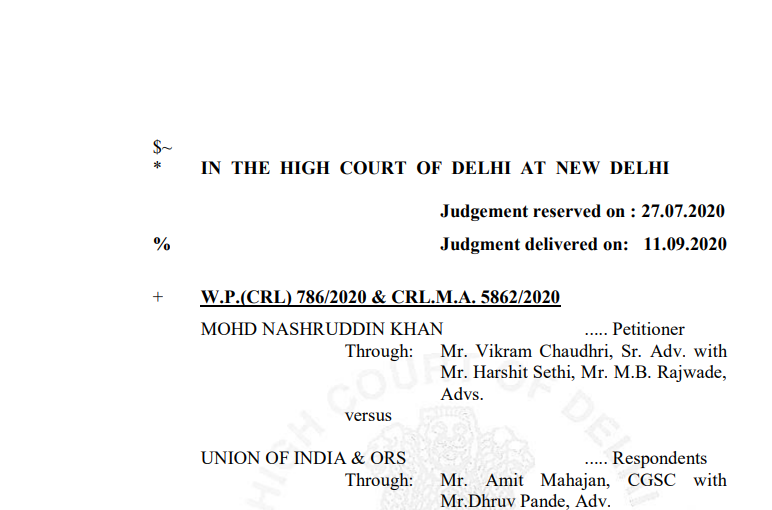Delhi HC in the case of Mohd Nashruddin Khan Versus Union of India
Case Covered:
Mohd Nashruddin Khan
Versus
Union of India
Facts of the Case:
The above-mentioned petitioners have preferred their respective writ petitions to seek similar reliefs. The underlying facts in these three cases are also similar, and stem out of – more or less, the same transaction. Learned counsel for the petitioner in each of these three cases is the same, and so is the counsel for the respondents. Learned counsels have advanced common arguments in all these three petitions, apart from pointing out certain specific features of each of these cases. Since the issues raised in all the three petitions are the same, we proceed to decide these petitions by this common judgment.
The reliefs sought by each of the petitioners is to seek quashing of the respective Detention Orders issued by respondent No.2 against each of them dated 21.01.2020 under Section 3(1) of the Conservation of Foreign Exchange and Prevention of Smuggling Activities Act, 1974 (COFEPOSA Act), and all consequential proceedings arising therefrom. The petitioners also assail the respective notifications issued by respondent No.2 in respect of each of them under Section 7(1)(b) of the COFEPOSA Act dated 17.03.2020 [in the case of the petitioner Mohd Nashruddin Khan(MNK)], dated 08.06.2020 (in the case of Gopal Gupta), and dated 17.03.2020 [in the case of Amit Pal Singh (APS)]. The petitioners have challenged the aforesaid Detention Orders at the pre-execution stage.
Observations of the Court:
Having considered the respective submissions on these aspects, we are of the view that there is no merit in the petitioners‟ submissions that neither of the three petitioners was not absconding. Abscondence is not only a matter of physical disappearance, but also carries with it the intent to hide, disappear, or evade the concerned person, or authority.
The petitioner MNK – while stating that he would not be found at his permanent address on account of his relationship with his parents not being good, failed to provide the actual address where he could be found. Even if the petitioner MNK was residing with his friends – as claimed by him, he should have provided the actual address where he would be residing, and if he were to shift from one address to the other, it was obligatory on him to keep the authorities posted of his current address to ward off the charge of absconding. Had the petitioner MNK intended not to evade service of the Detention Order, he would not have provided only his counsel‟s address for the purpose of service of communications and notices. Service/ execution of the Detention Order could, possibly, have not been effected on the counsel of the petitioner MNK. The purpose of serving the Detention Order is to actually detain the named detenue against whom the Detention Order has been issued. A Detention Order would lose its force and object, if it were to be served upon the representative, or counsel, as the element of surprise would be lost – which is crucial to be able to detain a person, as there is every likelihood of the person absconding, or evading execution of the Detention Order the moment he learns that such an order had been passed. The respondents are not obliged to serve the Detention Order, the Grounds of Detention, or the Relied Upon Documents on a third party. If this submission of the petitioner MNK were to be accepted, it would render the law of preventive detention completely ineffective and not workable. The petitioner MNK, however, failed to provide his actual address where he could be served the Detention Order. If the petitioner MNK was not to be found at his ancestral address, there was no point in furnishing the same. Thus, we are satisfied that the petitioner MNK deliberately absconded to evade the service of the Detention Order.
The decision of the Court:
For the aforesaid reasons, we find that, firstly, the petitioners are not entitled to maintain these petitions in view of their conduct of abscondence and in view of the decision of the Supreme Court in Subhash Popatlal Dave (supra), and even otherwise, we do not find any merit in any of the grounds taken by the petitioners to assail the Detention Orders issued in respect of each of them under Section 3 of the COFEPOSA Act at the pre-execution/ detention stage.
We, accordingly, dismiss these petitions leaving the parties to bear their respective costs. Interim orders stand vacated.
Read & Download the Full Decision in pdf:
If you already have a premium membership, Sign In.
 ConsultEase Administrator
ConsultEase Administrator
Consultant
Faridabad, India
As a Consultease Administrator, I'm responsible for the smooth administration of our portal. Reach out to me in case you need help.













